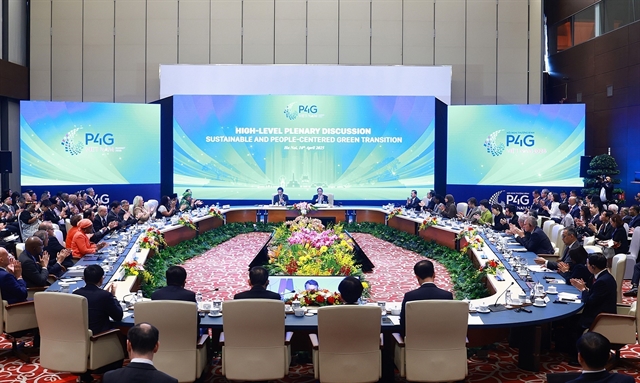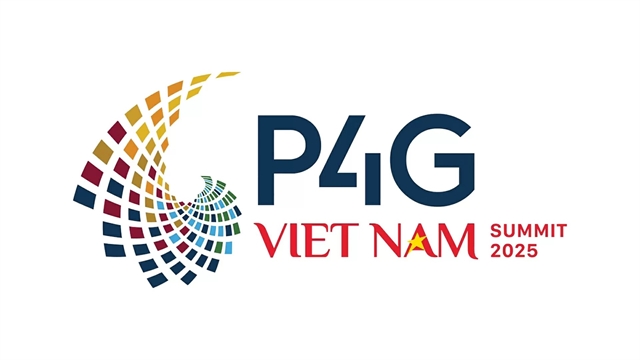 Economy
Economy

 |
Deputy Minister of Foreign Affairs Nguyễn Minh Vũ spoke to the press on the 4th Partnership for Green Growth and the Global Goals 2030 (P4G) Summit, being held in Hà Nội April 14-17, the first multilateral high-level conference in the field of green growth, green transition and sustainable development hosted by Việt Nam.
Could you please elaborate on this Partnering for Green Growth and the Global Goals 2030 (P4G) as a multilateral mechanism? What are its significant contributions to sustainable development, green growth and climate change mitigation?
Compared to many long-established regional and international organisations, the P4G Forum is relatively new, having only been initiated in 2017 by Denmark. This time, Prime Minister Mette Frederiksen of Denmark is not able to attend in person as he had to handle domestic issues, but will deliver a speech at the forum via video. The P4G Forum’s primary objective is to develop policies and foster public-private partnerships to promote green growth and contribute to achieving the Sustainable Development Goals (SDGs).
Currently, the forum has nine member countries: Denmark, the Netherlands, South Korea, Việt Nam, Indonesia, Kenya, Ethiopia, South Africa and Colombia. While the number of members is modest, summits attract widespread international participation, including from other nations and global organisations.
Recently, P4G has focused on four main areas: reducing food loss and waste, promoting climate-smart agriculture, ensuring sustainable water management and encouraging zero-emission mobility and renewable energy.
The forum turns these areas into concrete cooperation programmes and provides financial and technical support for small and medium-sized enterprises (SMEs) and start-ups tackling climate-related challenges. In its first phase, P4G invested around US$28 million in SMEs, and in its second phase, funding has exceeded $35 million. Though the financial scale may seem modest, the initiative’s value lies in addressing issues vital to member countries through public-private partnerships.
Some private-sector-led projects inspired by P4G may not be fully accounted for in the forum’s official statistics, but they still contribute significantly. We consider this forum small in size, but highly focused and relevant, especially to the interests of participating nations.
What are the key expected outcomes of this P4G summit?
Although the summit’s outcomes are not finalised yet, based on ongoing sessions and the high level of engagement, we expect substantial results.
Firstly, the enthusiastic participation of member states and relevant international organisations shows the forum’s growing importance. It will certainly help raise awareness—among policymakers and the public alike—about the urgency of responding to climate change and advancing inclusive, sustainable green development.
Secondly, we anticipate the summit will adopt two key declarations: The Hà Nội Declaration on Sustainable and People-Centred Green Transition and The Declaration on Strengthening Multilateral and Institutional Partnerships to Promote Green Transition and Sustainable Development.
Both emphasise the inevitability of green transition in achieving the SDGs—focusing on emissions reduction, renewable energy use and the circular economy, while highlighting technology and the critical role of SMEs and start-ups.
These declarations reflect a people-centred approach, encompassing small and micro-enterprises, start-ups and individuals in agriculture and food production. The declarations also outline necessary policies, coordination mechanisms and multilateral engagement strategies.
Thirdly, we expect to see various cooperation agreements signed between international organisations, businesses, and localities in related sectors. For example, the World Bank and the Asian Development Bank plan to sign major green growth and climate-related project agreements worth hundreds of millions of US dollars with Vietnamese stakeholders.
Why is the theme of Sustainable and People-Centred Green Transition chosen for this year's P4G edition?
The theme reflects an undeniable global trend. In practice, ensuring a sustainable green transition requires us to put people at the heart of the process—because people are not only the driving force of production, business and innovation but also the ultimate beneficiaries.
Farmers must adopt eco-friendly methods like water-saving techniques and limiting the use of harmful chemicals. Manufacturers must apply resource-efficient, low-emission technologies. Workers must acquire skills to minimise resource use. Policymakers must ensure that economic growth strategies are environmentally sound and sustainable.
This people-centred approach aligns closely with the Party and State's philosophy, that people are both the subject and object of all development policies, which means people are not just passive recipients but they also can partake in the green development processes. So, to sum up - why this theme? It’s all about awareness—raising awareness, reinforcing awareness and translating that awareness into action. Raising public awareness is critical to shaping a greener future.
What positive impacts has this summit had on Việt Nam, particularly in priority areas like green transition, climate change mitigation and sustainable development?
Việt Nam, as a developing country with per capita income just over $4,000, has strong economic development needs. But we also recognise the importance of environmental protection and climate response. The State of Việt Nam promotes rapid yet sustainable development.
Through this summit, we'd like to gain access to best practices and lessons from other countries and international experts on sustainable green transition. Additionally, the forum helps Việt Nam tap into external resources—particularly green finance ones—from other countries and international institutions like the World Bank and ADB. These are vital for green growth and sustainable development.
Lastly, Việt Nam has been a successful model for implementing Millennium Development Goals and now the UN's SDGs, even though we are still a quite poor nation. We aim to be a responsible and active member of the global community in achieving shared human development goals.
As you mentioned, zero-emission transport is a priority area for P4G. What outcomes has the forum achieved in this sector and are any agreements or commitments expected during this summit?
As a forum, P4G mainly serves to launch ideas—whether about technology or cooperation—rather than act as an implementing agency. Among its focal points is zero-emission mobility.
South Korea, a P4G member, has brought representatives from its specialised ministries and enterprises. Korea has strengths in areas like electric vehicle development and smart transportation—examples we hope to learn from. Denmark and Netherlands are also P4G members that have successes in low to zero-emissions transport, who can offer us their expertise.
Việt Nam currently has eight active P4G-funded projects totalling about $3 million, one of which focuses specifically on clean, zero-emission transport. We hope the summit will enable further expert exchanges and facilitate new partnerships in this crucial field. — VNS




